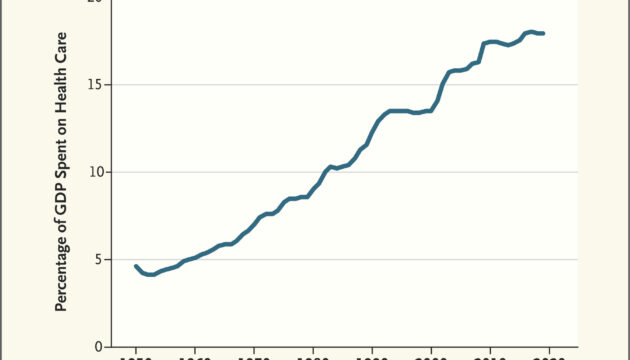Healthcare Reform
Our work in Healthcare Reform
-
Value Defects In The Health Services Sector
As of 2021, US health care expenditures exceed $3.8 trillion. It’s no secret that health care is nearly as wasteful in spending on value defects—behaviors that needlessly reduce quality, negatively impact the patient experience, or add to total costs of care—as it is in delivering clinical benefits.
Categorized in -
Stabilizing Health Care’s Share of the GDP
Since 1960, health care’s share of the GDP has risen by an average of 2.2 percentage points per decade, as compared with an average increase of 1.1 percentage points per decade in 15 other high-income countries since the early 1970s.
Categorized in -
Injuries Due to Medical Error are Common. They Could Be Prevented by Reducing Complexity
Research shows that medical error is the third leading cause of death worldwide.
Categorized in -
Improving Care of People With Serious Medical Illness—An Economic Research Agenda for Palliative Care
More people are living with serious illness as the population ages, and patients with socioeconomic disadvantages bear the greatest burdens of poor care.
Categorized in -
Improving Care of People with Serious Medical Illness: An Economic Research Agenda for Palliative Care
In 2020, Schaeffer Center established an Advisory Panel on Palliative Care. In this post, the panel outlines next steps to increase the quality of care of frail people with multiple chronic conditions.
Categorized in -
California Should Lead on Health Technology Assessment
California has the opportunity to take the lead on incorporating value-based pricing of health technology in the state healthcare system.
Categorized in -
Healthcare Delivery in California: Where Do We Go From Here?
On February 3, join Dana Goldman and Mark Ghaly, Secretary of the California Health and Human Services Agency, for a conversation on how California can deliver health care to everyone.
-
Development of High-Risk Geriatric Polypharmacy Electronic Clinical Quality Measures and a Pilot Test of EHR Nudges Based on These Measures
USC researchers developed measures of high-risk polypharmacy and pilot tested novel electronic health record (EHR)-based nudges grounded in behavioral science to promote deprescribing.
Categorized in -
Comments on No Surprises Act Rulemaking: Part II
Loren Adler, Matthew Fiedler, and Benedic Ippolito offered comments on an interim final rule (IFR) issued by the Departments of Health and Human Services, Labor, and the Treasury that implements portions of the surprise billing provisions included in the No Surprises Act.
Categorized in -
Targeting Affordability in Healthcare: A Review of the Evidence
Health plans have many tools to reduce spending and therefore reduce plan premiums, which can improve the affordability of health insurance.
Categorized in









